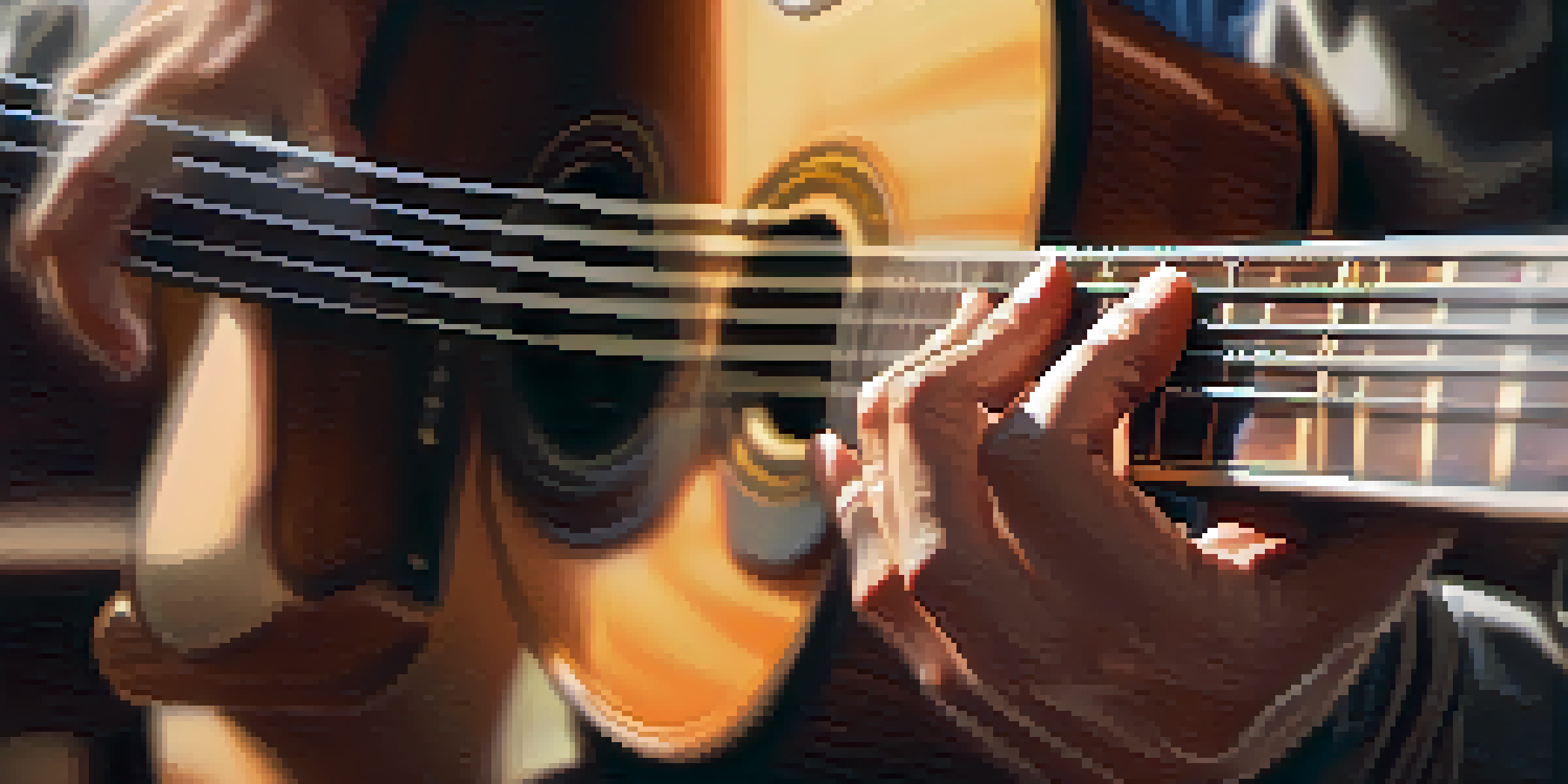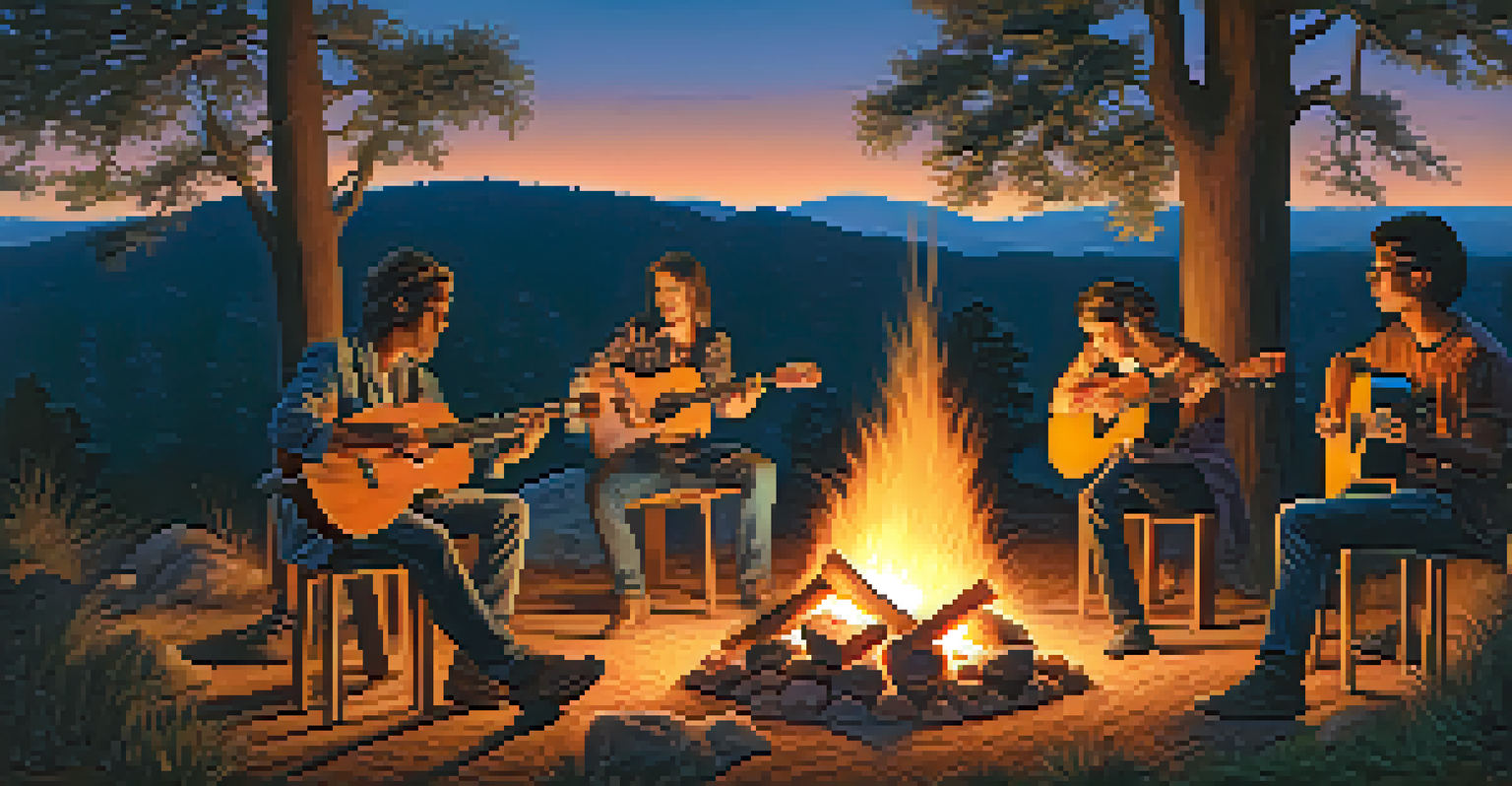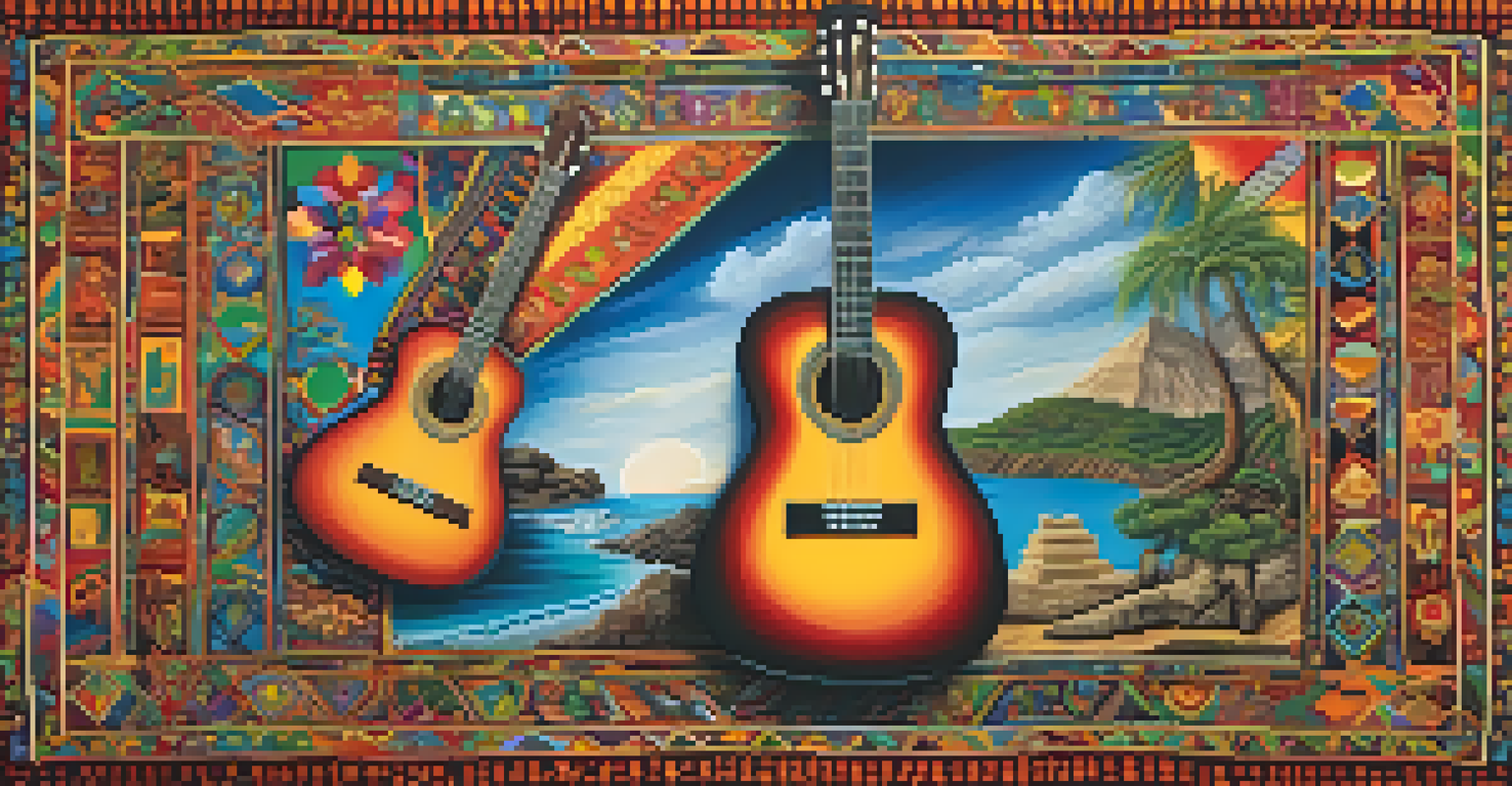Exploring Personal Identity Through Guitar Style and Genre

The Connection Between Music and Identity
Music is more than just sound; it's a powerful expression of who we are. Each note strummed on a guitar can echo emotions, experiences, and beliefs, shaping our personal identity. For many, the choice of guitar style and genre acts as a canvas, illustrating their unique story to the world.
Music can change the world because it can change people.
Consider a blues guitarist pouring their heart into a solo—every bend and slide reflects their struggles and triumphs. This deep connection helps listeners resonate with the musician’s journey, fostering a sense of understanding and empathy. Ultimately, the genres we choose often mirror our backgrounds, values, and life experiences.
Moreover, as we evolve, so can our musical tastes and styles. This evolution reveals the dynamic nature of identity, allowing us to explore new facets of ourselves while connecting with different communities through shared musical expressions.
How Genre Shapes Personal Narrative
Genres like rock, jazz, or classical offer distinct narratives that can resonate with different aspects of our lives. For instance, a rock guitarist might embody the rebellious spirit of youth, while a classical player might connect with tradition and discipline. These narratives help us communicate our identity to others in a relatable way.

When we identify with a particular genre, we often find comfort in its themes and messages. A singer-songwriter performing heartfelt ballads may connect with listeners experiencing love or loss, creating a shared emotional landscape. This bond not only enhances our understanding of ourselves but also strengthens community ties.
Music Reflects Personal Identity
The genres and styles we choose in music serve as a canvas for expressing our unique experiences and emotions.
As we delve deeper into a genre, we might also discover new influences and techniques. This exploration can lead to a richer, more nuanced personal identity that blends various styles, ultimately creating a unique musical voice that reflects our multifaceted lives.
The Role of Guitar Technique in Self-Expression
Guitar techniques, such as fingerpicking or shredding, are not just skills; they are extensions of our personality. The way we approach our instrument can reveal our temperament and emotional state, further defining our identity. For example, a musician who plays softly with intricate fingerstyle may convey introspection and sensitivity.
The music we listen to and the instruments we play tell our stories, revealing who we are and where we come from.
On the flip side, a guitarist who embraces fast-paced, aggressive techniques could be expressing confidence or a desire for freedom. These choices are deeply personal and often reflect our inner thoughts and feelings. They can also influence how we interact with others in musical contexts, impacting collaborations and friendships.
As we refine our techniques, we may also encounter challenges that push us to grow. This journey of overcoming obstacles not only enhances our musical abilities but also fosters resilience and self-awareness, enriching our personal identity in the process.
Cultural Influences on Guitar Styles
Guitar styles are often deeply rooted in cultural backgrounds, shaping our understanding of identity. For instance, flamenco guitar reflects the rich traditions of Spanish culture, while reggae guitar embodies the spirit of Jamaican roots. These cultural influences provide a sense of belonging and connection to our heritage.
When we embrace these styles, we not only honor our culture but also share its stories with others. This act of cultural exchange allows us to foster appreciation and understanding among diverse communities, reinforcing our personal identity while bridging gaps between different musical traditions.
Technique Reveals Our Personality
Guitar techniques not only showcase our musical skills but also act as extensions of our personality and emotional state.
Exploring various cultural guitar styles can also invite us to step outside our comfort zones. This exploration encourages us to blend different influences, creating a unique sound that represents our individual identity while celebrating the diversity of the musical world.
Personal Growth Through Musical Exploration
Embarking on a journey through different guitar styles often leads to personal growth. As we experiment with various genres, we discover new aspects of ourselves and our musical abilities. This exploration not only enhances our technical skills but also encourages self-discovery, revealing hidden passions and interests.
For instance, a guitarist who initially gravitates towards rock might find joy in playing folk music, leading to new songwriting opportunities and a broader emotional palette. This growth can be empowering, allowing us to redefine our identity as we evolve musically and personally.
Additionally, the challenges we face while learning new styles can foster resilience. Each hurdle we overcome builds confidence and reinforces our sense of self, ultimately reflecting our growth as musicians and individuals.
Community and Identity in Music
The guitar community offers a rich tapestry of shared experiences and connections. By engaging with fellow musicians, we can explore our identities in a supportive environment. Whether through jam sessions or online forums, these interactions often deepen our understanding of ourselves and our musical choices.
Collaborating with others can also inspire creativity, pushing us to experiment with new genres and techniques. This exchange of ideas often leads to the development of unique styles that blend personal influences, creating a musical identity that resonates with both ourselves and our peers.
Cultural Roots Shape Musical Styles
Embracing diverse guitar styles rooted in cultural backgrounds fosters a sense of belonging and enhances our personal identity.
Moreover, the sense of belonging within a musical community can be incredibly validating. Sharing our journey with others who understand our struggles and triumphs reinforces our identity, reminding us that we are not alone in our pursuit of self-expression.
Finding Your Unique Voice Through Guitar
Ultimately, exploring personal identity through guitar means finding your unique voice. This journey involves understanding your influences, experimenting with various styles, and embracing the narrative that resonates with you. As you navigate this path, remember that your voice is a reflection of your experiences and emotions.
It's important to remember that there’s no right or wrong way to express yourself. Each musician’s journey is unique, and embracing your authenticity will lead to a more fulfilling musical experience. Trusting your instincts and allowing your personality to shine through can help you carve out a distinctive space in the vast world of music.

As you continue to grow and evolve, your musical identity will also shift. Embrace this change as part of your journey, and remember that every chord you play contributes to your unique story—one that can inspire and connect with others in profound ways.